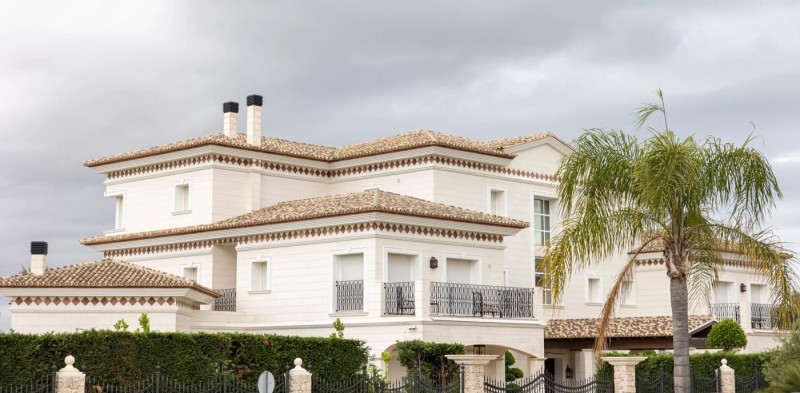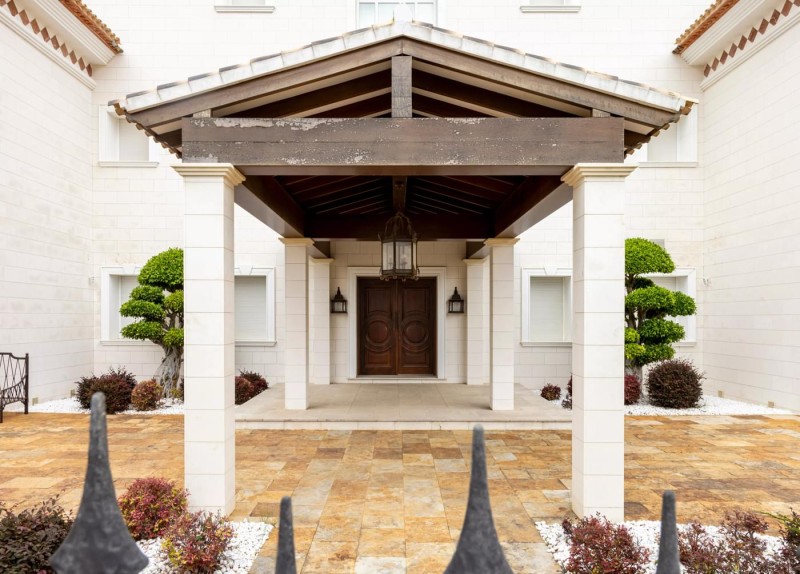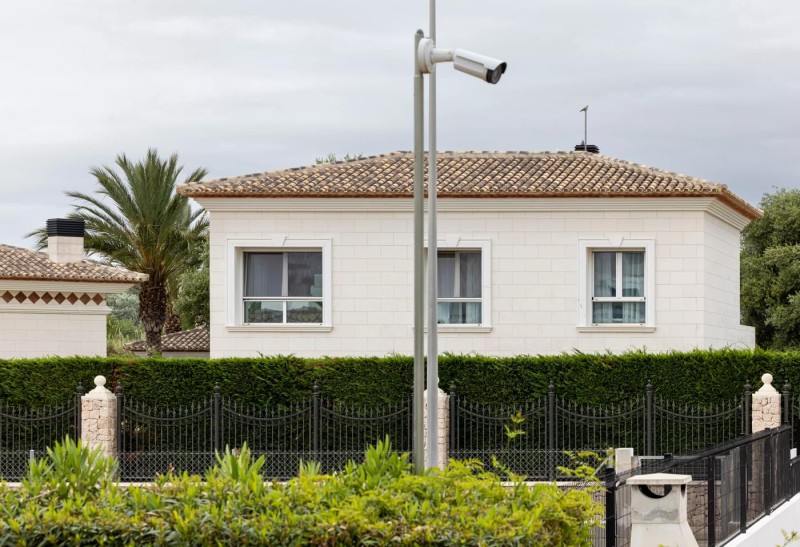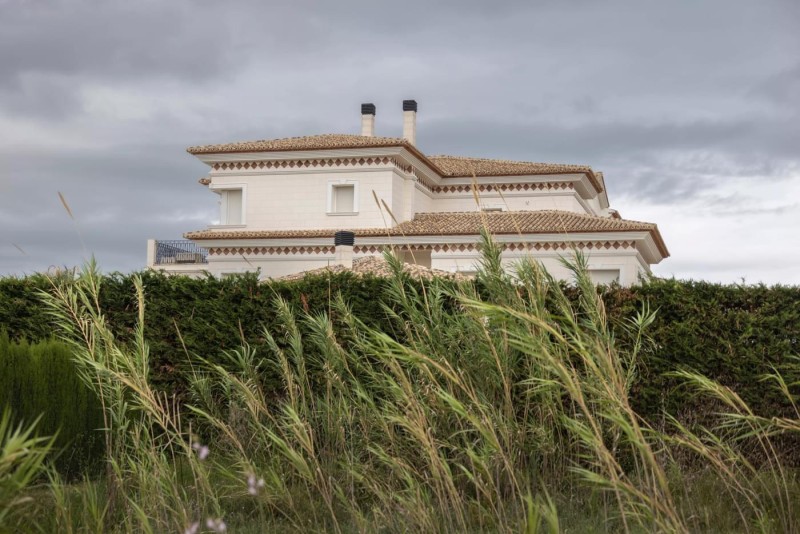For years, Boris and Karina Rotenberg’s ostentatious coat of arms presided over an imposing mansion in Oliva, Spain, on the sundrenched Mediterranean coast. The villa features a lush garden and swimming pool that overlook the 15th hole of the Oliva Nova golf course. The couple spent the equivalent of $10.8 million on the property. The curtains alone cost $256,000.
This extravagant acquisition, which has never before been reported, was nothing unusual for the Rotenbergs. Boris and his brother Arkady are Russian billionaires and childhood friends of President Vladimir Putin. Over many years under his rule, the brothers’ companies benefited from lucrative state contracts, including for some of the president’s pet projects, like the 2014 Winter Olympic games in Sochi.
But recently the coat of arms disappeared. In October 2022, Spanish authorities quietly froze the property, according to a Spanish land registry document obtained by reporters. The document said the villa was connected to an individual sanctioned by the EU over the Russian invasion of Ukraine. It didn’t name the person, but a new leak of emails indicates it was either Boris or Karina Rotenberg.
The leak of more than 50,000 emails and documents, obtained by IStories and OCCRP, sheds unprecedented light on the schemes used by associates of Boris and his brother Arkady to protect the oligarchs’ assets and companies. Dubbed the Rotenberg Files, it reveals how a Russian businessman named Maxim Viktorov helped the blacklisted billionaires get around some of the financial, legal, and reputational problems caused by sanctions.
The emails suggest the Spanish villa was among Boris and his wife’s most prized assets. Viktorov, a lawyer who did his military service with Russia’s KGB in the early 1990s, is seen in the emails personally monitoring its construction. And Karina Rotenberg herself was closely involved with the design, even calling the contractors “fools” for using cheap materials, writing: “You installed IKEA quality in the main dressing rooms!”
The emails also show that, before the villa was frozen, a series of lawyers and service providers had spent years changing the property’s ownership structure, rewriting its financial history, and constructing backdated paper trails in an apparent effort to protect it.
These techniques worked for nearly a decade, but ultimately failed to keep it from being frozen.
Viktorov said neither he nor any of his companies had ever violated any laws, “in particular, the U.S. and EU sanctions legislation.” He described reporters’ findings as “erroneous.”
The Rotenbergs did not respond to emailed questions.
About The Rotenberg Files
The Rotenberg Files is an investigative project based on a leak of over 50,000 records, including nearly 30,000 emails and some 12,000 documents, that shed light on how Russia’s most infamous oligarchs, the Rotenberg brothers, dealt with being sanctioned by the West.
The Rotenbergs Avoid A Tax
In late 2013, as they prepared for the purchase of the land where they would build their luxury villa, Karina and Boris Rotenberg were planning to use an offshore company to own it, the leak shows. Russia had not yet annexed Crimea, and the issue of sanctions may not have been on anyone’s radar. But for oligarchs, it had been standard practice for decades to own property through opaque companies that did not have to disclose their owners because they were based in tax havens.
A December 2013 sales contract found among the leaked emails shows that the Rotenbergs initially planned to purchase the land for the villa through the British Virgin Islands (BVI) company Belnet Holdings Limited. A contract was already signed before the couple learned that Spanish law required a three percent annual tax on real estate held by offshore companies like Belnet.
The tax issue appears to have prompted a rethink. In November 2014, the Rotenbergs’ Spanish lawyer Cristina Garrido wrote to an employee of the Rotenbergs’ Russian fixer, Viktorov.
In the email, Garrido wrote that since the BVI didn’t work “tax wise,” a Maltese firm called Bangalor Holding Ltd. had been set up to buy the property instead.
On paper, the company’s owner was initially listed as a Maltese corporate service provider called Kinanis Fiduciaries Limited, which appears from the records to have been hired to help in the process.
The official purchase agreement was signed in Bangalor’s name in December, but construction at the villa had already begun, seemingly under the terms of the since-abandoned Belnet contract.
Garrido’s emails reveal that the payments to the contractor had been coming from Boris Rotenberg’s Cypriot company, Logotax Development Limited. According to the leak, Logotax had made four payments totalling 4 million euros by the time Bangalor signed the purchase agreement in December 2014.
“We have done all the expansions on the house without a valid contract,” the developer’s representative later wrote Viktorov. “Only reason I have done that is because I trust our clients blindly and I'm sure they will fulfill their part.”
In emails to Viktorov’s employee at the time, Spanish lawyer Garrido described a scheme that would explain the already-made payments, as well as future ones, while creating a firewall between Logotax on one side and the villa and Bangalor on the other.
Logotax would classify all payments to the developer “as a ‘loan,’” Garrido wrote, before passing the right to collect the debt to Bangalor in Malta, which would write it off in return for the land plot and the construction work on the villa.
Collin Hunt, a former U.S. Treasury intelligence analyst, said such convoluted arrangements were typical of oligarchs seeking to disguise the origins of funds and hide their connection to assets.
“That is, from what I have seen, a fairly common tactic,” Hunt told OCCRP. “It is pretty common among that set of Russian elites to just have almost fictitious loans, loans that are between seemingly unrelated entities that are actually beneficially owned by the same set of characters or their associates and that really have no intention of being paid back.” Garrido did not respond to requests for comment.
Anonymous Fund
The complex scheme would come under scrutiny three years later, when auditors questioned the relationship between the parties in the loan agreement, which was holding up Bangalor’s 2015 audit. The Maltese financial advisors from Kinanis responded by suggesting a further separation between Logotax and Bangalor.
To accomplish this, Kinanis suggested creating two separate loan agreements with Bangalor's corporate owner: One agreement with Bangalor, and the other with Logotax.
The employee was particularly clear on one point: “Bangalor should not transact directly with [Logotax].”
The emails do not make clear what solution was implemented, but sometime by 2018 a subsidiary of an anonymous Russian investment fund called Phoenix Trust (Feniks Trast) showed up as the owner of Bangalor in corporate documents and in a bank record. The trust had been set up by Evocorp, Vikotorov’s management company.
However, the arrangement may have been short-lived.
In October 2018, Elena Ruzyak, who had worked at Rotenberg’s SMP Bank and became a general fixer for him, forwarded an email to Viktorov with advice from a Maltese tax and advisory firm which raised a red flag about his involvement.
“I can imagine why the local service providers are not happy to support [Bangalor],” wrote the firm. “For the main shareholder of the managing company [of Phoenix Trust,] the first link shows ‘an advisor for the Russian Defense Ministry and former KGB officer’.”
Fixing the Problem by Backdating
Despite years of attempted solutions, the problem was not fixed, and subsequent audits after the troubled 2015 audit would not be completed until 2019.
Exacerbating the problem was that the Rotenbergs, or their advisors, appear to have struggled to grasp the need to keep Logotax and Bangalor separate, according to the emails.
“Please clarify [for] the customer one more [time] why the agreement should be signed between [the owner] and Bangalor and not between [Logotax] and Bangalor,” wrote an an employee at ILS, a legal advice company often used by Viktorov, to Kinanis.
In addition, Kinanis resigned from working with Bangalor, apparently because of continued problems with its 2015 audit. Neither Kinanis nor ILS responded to questions from reporters.
The solution finally reached was to create a new arrangement and backdate it.
In April 2019, Ruzyak forwarded a draft agreement for Logotax to directly loan Bangalor the cost of the Spanish property, backdating the contract to January 1, 2016, and stating that it had already transferred the amount to the developer on behalf of Bangalor. Gone were Phoenix and the other intermediaries, and the loan agreement directly connected the Rotenberg-owned Logotax with Bangalor.
Ruzyak did not answer emailed questions.
Bangalor was relocated to Cyprus in October 2020, apparently following questions from Maltese registration agents about its true owner. A leaked email shows a Cypriot lawyer floating the idea of “redomiciliation of the company to Cyprus” in a February 2018 message to Ruzyak.
Bangalor’s 2020 financials, obtained from the Cypriot registry, show evidence that the Bangalor-Logotax loan agreement was indeed carried out. The statement shows a debt in the amount of 11.6 million euros listed as a third party loan. A year later 11.7 million euros were reclassified as a shareholder loan. The 2021 statement also lists Logotax and Bangalor as related parties, meaning the two companies had significant management or ownership interest in one or the other.
By early 2022 both Boris and Karina had been added to the EU sanctions list, and half a year later, Spanish authorities froze the villa.








